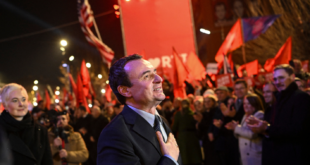By IsaIntel
A rally organized by the Serbian Progressive Party (SNS) on 5 February in the Serbian capital Belgrade showed that the party is the single strongest party in the country, but also that it has no idea how to resolve the urgent political and economic problems.
Carried on by an emotional crowd of some 100,000 supports, SNS leader Tomislav Nikolic gave the government a two-month deadline to schedule early elections, threatening continued protests and a blockage of all major roads until new elections are scheduled.
SNS officials said that the two-month deadline was the maximum deadline in order to conduct much-needed economic reforms, save the country from corruption and stabilize its path toward EU integration.
The high turnout at the rally is largely a reaction to the low standard of living in Serbia, a low average monthly salary of €370, record 20% unemployment and a nearly daily increase in prices and taxes.
Workers in the education sector and some police officers have already joined in the strike, and protests have also been announced by workers in other sectors, most notably health care. Though economic experts close to the government have announced better days ahead for the Serbian economy, the indicators of this are weak.
Aside from some strongly worded speeches, the SNS has failed to offer any clear path out of the economic and political crisis. Still, their frustration is understandable. For almost a year now, the SNS has been the single most popular party in the country, though it rules only in the Belgrade municipality of Vozdovac and a few smaller municipalities.
The next elections are scheduled for 2012, and the opposition fears this is too far away to maintain its popularity in the face of a lack of media support. As such, the party is forced into constant action, despite its lack of clear resolutions to the country’s problems.
On other side of the political divide, Boris Tadic’s government has a narrow but very stable majority in the country’s parliament and absolutely no interest in holding early elections – a least not before they achieve some diplomatic victory that could be used for an election campaign. This could happen later this year when Serbia is expected to win EU candidate status. With such a success, Tadic’s ruling coalition could face down the SNS.
However, it will be interesting to see if Nikolic will continue to push for his two-month deadline, as it may be too costly politically.
Aside from ideological and political differences and fight for voters, both parties are aware that social unrest could damage their ratings, while some other party could profit from it. Poverty and continued protests are fodder for instability, organized crime and corruption, and because of this, Nikolic and Tadic are likely to call a cease fire in the name of political survival. The cease fire could even culminate in a grand coalition between the Democratic Party (DS) and SNS following the elections, no matter when they are held.
Earlier today, Economy Minster and Deputy Prime Minister Mladan Djinkic was replaced, though his G17 party will not quit the government. The decision was made by Prime Minister Mirko Cvetkovic, and comes after statements made by Djinkic over the last few days that the state of affairs were “bad and in urgent need of changes”.
Source: isaintel.com
 Eurasia Press & News
Eurasia Press & News



